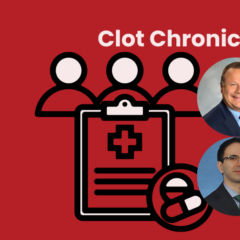Last updated on
Clot Chronicles: Building an Afib Center of Excellence
Hello, I’m Dr. Elliott Antman from the Brigham and Women’s Hospital in Boston. I’m a cardiologist here in our cardiovascular division, and today we’re going to be talking about an atrial fibrillation center of excellence that we are developing here at the Brigham, the Brigham Health Atrial Fibrillation Center of Excellence.
Now why would we develop such a center, what does it offer individuals, and when would an individual be seen in the Atrial Fibrillation Center of Excellence? Atrial fibrillation is a common rhythm problem. Perhaps 12 million people in the United States are projected to have atrial fibrillation by the year 2030. It’s a serious heart rhythm problem because it carries with it a five-fold increased risk of an embolic stroke or a clot coming out of the heart going to an artery in the brain, and it decreases an individual’s exercise capacity – sometimes they have lightheadedness or shortness of breath.
Now, the interesting aspect of atrial fibrillation is that it’s seen much more commonly in individuals who have some form of heart disease or who have risk factors for developing heart disease. Those risk factors, of course, are chronic situations or chronic diseases, like high blood pressure, obesity, diabetes, and cigarette smoking. And up until now, the care for each of those rivers for atrial fibrillation has been fragmented. Sometimes an individual would be seen in the smoking cessation clinic, another medical team would be dealing with a person’s high blood pressure, and yet another team would be dealing with their diabetes, and an anticoagulation service would be determining how much they should take of their anticoagulant drug.
It would help a lot if we could actually have a much more coordinated effort, and that’s what our Center of Excellence does. It brings an organized team together for comprehensive care of an atrial fibrillation patient. So, we are actually doing something very interesting here at the Brigham and Women’s Hospital. We’re actually using pharmacists, who are so experienced in managing anticoagulant therapy, and asking them to help manage high blood pressure, diabetes, heart failure, elevated cholesterol, and a number of other conditions that are drivers for the development of atrial fibrillation.
We also have a team that’s working with us to deal with lifestyle issues such as exercise, nutrition, and weight reduction, and we have specialists who are standing by ready to care for individuals who have particular cardiovascular problems, like heart failure or some deposition of abnormal substances in the heart muscle, or genetic predisposition to an abnormality of the heart muscle. We have electrophysiologists, special cardiologists, who can actually implant devices or perform procedures to manage a person’s atrial fibrillation. So, what we’re doing with our Center of Excellence is providing comprehensive care for the patient with atrial fibrillation.
We do need to learn more about individuals who have atrial fibrillation, and those are the things that we’re focusing on in addition to the comprehensive care. We’re actually enrolling individuals who come into our center in clinical trials, so that we can study the best way to treat them now and in the future.
And finally, perhaps some of you have heard about precision medicine. This is where we actually take everything we know about a specific individual and come up with a very precise plan for managing their health problem – in this case, atrial fibrillation.
And what we’re planning to do over several years in our Center of Excellence is to make a map—a precision medicine map—of the atrial fibrillation patient and get very precise with recommendations about how to manage a patient with atrial fibrillation. We’ve reserved a toll-free number for individuals who can refer themselves or can be referred by their primary care doctor or their doctors in their community, and we have a coordinated program that will be connected with the electronic health record here at Brigham Heath.
So, we hope that you will take note of our Atrial Fibrillation Center of Excellence, and we hope that it will be helpful to you as you refer patients with atrial fibrillation – or if you’re a patient who has atrial fibrillation and would like more information about how your condition should be managed, this is a perfect situation for you as well.
Thank you for listening. This is Dr. Elliott Antman for Clot Chronicles.



